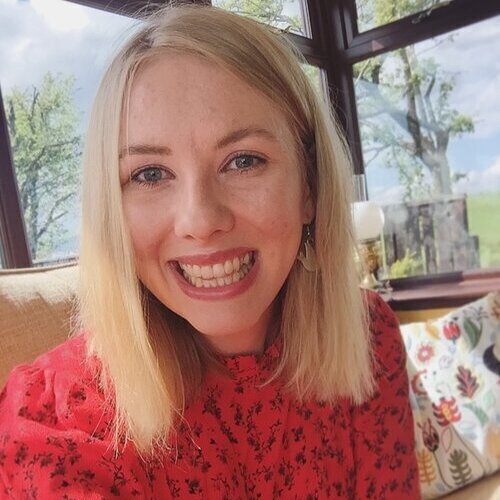Tell us a little bit about yourself...
I'm Koren and I'm from Scotland. I graduated from the University of Stirling with a BSc honours in Psychology in 2019. I then went onto complete the COSCA counselling skills certificate at the University of Glasgow from 2019-2020. After that I was thankfully accepted onto the MSc Counselling and Psychotherapy course at the University of Strathclyde in 2020. In my spare time, I love being out in nature such as walking or wild swimming. I find it so refreshing and a great stress reliever to decompress after difficult client sessions.
Why did you choose Strathclyde for your postgraduate degree?
I felt drawn to study this particular Counselling & Psychotherapy programme for a few reasons. The person-centred modality appealed to me the most because I view people as unique individuals and like to treat them as such. Training in this approach offered me the flexibility to do that by establishing unique therapeutic working relationships with clients instead of a ‘one size fits all’ perspective. I also love that counsellors/psychotherapists who practice the person-centred approach encourage clients to draw on their own internal resources, empowering them to make their own decisions and develop endurance to face whatever life situation they are faced with. As well as this, the fact this Masters was a year in length was a major selling point for me personally because the strong majority of counselling Masters programmes in the UK are part time over three years. I felt a full time programme of study suited how I learn as I believed I would gain more from being fully immersed into a course, instead of the learning being spread out over a longer period of time. I still feel extremely grateful to have been accepted onto this highly popular and sought after MSc programme.
What initially sparked your interest in Counselling & Psychotherapy?
I had wanted to pursue a career in counselling and psychotherapy for many years. I have chosen to pursue this career path because I am very passionate about supporting the needs of others. I signed up for an evening introduction to counselling course at college to complete in my spare time when in sixth year of academy. I really enjoyed the course but had not decided firmly that was going to be my career path at that point. However, what I did know was that I wanted to enter a career in a helping capacity. So, I went onto study a psychology degree as a stepping stone to enter such a career.
Whilst completing my undergraduate degree, I gained lots of experience supporting others. For example, I was a witness service volunteer for Victim Support Scotland for a year and a half and I also went to Bali and East Java for a month on a psychology mental health placement. There I worked in psychiatric facilities and rehabilitation centres, running therapeutic activities for service users who experienced mental and/or physical difficulties. I also attended personal therapy and witnessed the transformational effect it had on my own life. Therefore, I already had a good understanding of some of the emotions, the bravery and vulnerability that people bring to counselling sessions. My academic, voluntary and personal experiences have guided me down this career path. I like to think of myself as a very caring, empathetic and understanding person. Therefore, I felt a strong calling to pursue counselling and psychotherapy so that I could utilise my skills to benefit the needs of others. It is, and always will be, a privilege to walk alongside my clients in their pain and watch them grow.
What advice would you give to someone considering studying your course?
Firstly, I cannot stress enough both how academically and emotionally demanding this course is. Please keep yourself safe and only consider doing this course if you feel in the headspace to do so. The course requires you to bring so much of yourself. Therefore, it is essential you practice good self-care. It is worth having some money laid aside in case you feel you require personal therapy whilst completing this course.
Secondly, pragmatically, I would advise people to try keep on top of coursework to avoid feeling overwhelmed and to organise and start placements as soon as possible in order to collate the 100 client counselling hours needed to gain the MSc. Lastly, where possible, due to how intense the course is, I would not recommend working as well as studying. I personally know I could not have managed both and found it extremely rewarding fully immersing myself in the course. So strap in for a roller coaster ride of a year, throw yourself into everything, try and get as much as you can from the process and notice the changes in yourself unfold.
Tell us about the format of the programme. What was a typical week like for you?
In general, a typical week would consist of covering a different topic each day. It was a very experiential programme so skills practices and group discussions were often included. Some days the cohort would come together for large personal and professional development groups and the class would also split off into their assigned supervision groups and small personal and professional development groups for part of the day. When it came to dissertation writing, we had weekly meetings with our dissertation supervisor and group for part of the day also.
Can you tell us a little bit about your experience on placement?
During this course I had two placements, both of which were online to begin with. I mainly worked on zoom but also had some telephone sessions with clients as well. However, later in the year, I was fortunate enough to be at one of the few placements who were going back to offering in-person counselling sessions as well. Therefore, I got to experience seeing clients online and face to face. My placements were an integral part of my training. They allowed me to see how the person-centred theory unfolded in the therapy room with real clients which was a special moment. I also got the opportunity to work with a range of presenting issues and clients from all different backgrounds and sectors of society. I grew into my role as a counsellor in training, learning how to maintain professional boundaries, how to manage a client case load and how different counselling organisations operated.
Tell us a little bit about the additional skills you have gained through this programme?
Through conducting client counselling sessions online and by telephone, I gained additional skills and knowledge on this course I would not have had the opportunity to develop at this stage if it were not for the pandemic. For example, working with clients remotely is a very different experience to working face to face. I had to consider more things in terms of contracting and safe guarding clients as well as what to do in the event of there being a fault with the technology. I can now carry these skills forward and reach a greater number of clients through using a blended way of working, catering more widely to clients’ needs. I have had clients who have presented as high risk. I have learned from these experiences and developed my skills to take the appropriate action required when working with similar situations in future. My congruence, self-awareness and perceptiveness has also increased substantially.
What do you think of the support available on your programme?
I cannot fault the tutors at all because the level of support available throughout the course has been phenomenal. I felt well supported both academically and practically when I started seeing clients. There were weekly dissertation group meetings so I felt well supported through that whole process. A new addition to the course this year was the weekly Q&A session which I found very helpful. This was started due to there not being the opportunity for everyone to ask questions after class like previous years because we were working online. This showed me how the tutors were willing to adapt with the changing COVID situation and support the student’s needs to the best of their ability. I learned so much from my supervision group peers and tutor when we started discussing our client work. I always felt well supported by my supervision tutor when I stumbled across client situations I felt I needed to discuss further or seek guidance on.
Where are you working now? Tell us about the journey to securing the role and how your Masters helped you prepare for this.
I have been working for Rookie Rockstars as a primary school counsellor for year now. I had to apply for quite a few different jobs counselling children before I gained this job. However, I knew this was an area of counselling I really wanted to gain experience in so I persevered and I am thankful that I did. Although this form of counselling is very different to counselling adults, I still maintain the person-centred way of working, embodying Rogers three core conditions of congruence, empathy and unconditional positive regard which was deeply instilled in me through this Masters programme. This course lays the foundations for you to build on your learning in order to help you find your own path as a counsellor in an area you feel drawn to work in.
I also work in private practice with adult clients, including being an affiliate counsellor with an organisation called Healed Scars Trauma and Abuse Recovery (HSTAR). I secured this role by literally just walking past one of their offices one day and popped in to ask if they had any positions available to work alongside them, so I was very fortune. The excellent training I received on this course combined with my placement experiences prepared me well to work with clients who have experienced trauma.
Alongside this, I published a book on Amazon called ‘The Little Book of Self-Discovery’. This book covers ten personal development topics from a person-centred theory perspective along with thought provoking questions for deep introspection and reflection about yourself and life. The Masters inspired me to write this book, taking all that I had learned to hopefully support/help someone on their growth journey through the guided discussions and questions.
Any final points, or words of wisdom?
If you feel called to enter this career path, do not let limiting emotions hold you back from taking what may feel like a leap of faith. After all, without taking a leap, we may never learn to fly.

